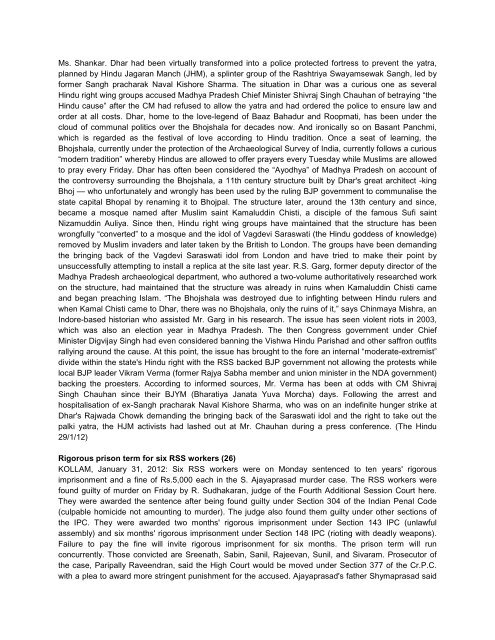You also want an ePaper? Increase the reach of your titles
YUMPU automatically turns print PDFs into web optimized ePapers that Google loves.
Ms. Shankar. Dhar had been virtually transformed into a police protected fortress to prevent the yatra,<br />
planned by Hindu Jagaran Manch (JHM), a splinter group of the Rashtriya Swayamsewak Sangh, led by<br />
former Sangh pracharak Naval Kishore Sharma. The situation in Dhar was a curious one as several<br />
Hindu right wing groups accused Madhya Pradesh Chief Minister Shivraj Singh Chauhan of betraying “the<br />
Hindu cause” after the CM had refused to allow the yatra and had ordered the police to ensure law and<br />
order at all costs. Dhar, home to the love-legend of Baaz Bahadur and Roopmati, has been under the<br />
cloud of communal politics over the Bhojshala for decades now. And ironically so on Basant Panchmi,<br />
which is regarded as the festival of love according to Hindu tradition. Once a seat of learning, the<br />
Bhojshala, currently under the protection of the Archaeological Survey of India, currently follows a curious<br />
“modern tradition” whereby Hindus are allowed to offer prayers every Tuesday while Muslims are allowed<br />
to pray every Friday. Dhar has often been considered the “Ayodhya” of Madhya Pradesh on account of<br />
the controversy surrounding the Bhojshala, a 11th century structure built by Dhar's great architect -king<br />
Bhoj — who unfortunately and wrongly has been used by the ruling BJP government to communalise the<br />
state capital Bhopal by renaming it to Bhojpal. The structure later, around the 13th century and since,<br />
became a mosque named after Muslim saint Kamaluddin Chisti, a disciple of the famous Sufi saint<br />
Nizamuddin Auliya. Since then, Hindu right wing groups have maintained that the structure has been<br />
wrongfully “converted” to a mosque and the idol of Vagdevi Saraswati (the Hindu goddess of knowledge)<br />
removed by Muslim invaders and later taken by the British to London. The groups have been demanding<br />
the bringing back of the Vagdevi Saraswati idol from London and have tried to make their point by<br />
unsuccessfully attempting to install a replica at the site last year. R.S. Garg, former deputy director of the<br />
Madhya Pradesh archaeological department, who authored a two-volume authoritatively researched work<br />
on the structure, had maintained that the structure was already in ruins when Kamaluddin Chisti came<br />
and began preaching Islam. “The Bhojshala was destroyed due to infighting between Hindu rulers and<br />
when Kamal Chisti came to Dhar, there was no Bhojshala, only the ruins of it,” says Chinmaya Mishra, an<br />
Indore-based historian who assisted Mr. Garg in his research. The issue has seen violent riots in 2003,<br />
which was also an election year in Madhya Pradesh. The then Congress government under Chief<br />
Minister Digvijay Singh had even considered banning the Vishwa Hindu Parishad and other saffron outfits<br />
rallying around the cause. At this point, the issue has brought to the fore an internal “moderate-extremist”<br />
divide within the state's Hindu right with the RSS backed BJP government not allowing the protests while<br />
local BJP leader Vikram Verma (former Rajya Sabha member and union minister in the NDA government)<br />
backing the proesters. According to informed sources, Mr. Verma has been at odds with CM Shivraj<br />
Singh Chauhan since their BJYM (Bharatiya Janata Yuva Morcha) days. Following the arrest and<br />
hospitalisation of ex-Sangh pracharak Naval Kishore Sharma, who was on an indefinite hunger strike at<br />
Dhar's Rajwada Chowk demanding the bringing back of the Saraswati idol and the right to take out the<br />
palki yatra, the HJM activists had lashed out at Mr. Chauhan during a press conference. (The Hindu<br />
29/1/12)<br />
Rigorous prison term for six RSS workers (26)<br />
KOLLAM, January 31, 2012: Six RSS workers were on Monday sentenced to ten years' rigorous<br />
imprisonment and a fine of Rs.5,000 each in the S. Ajayaprasad murder case. The RSS workers were<br />
found guilty of murder on Friday by R. Sudhakaran, judge of the Fourth Additional Session Court here.<br />
They were awarded the sentence after being found guilty under Section 304 of the <strong>Indian</strong> Penal Code<br />
(culpable homicide not amounting to murder). The judge also found them guilty under other sections of<br />
the IPC. They were awarded two months' rigorous imprisonment under Section 143 IPC (unlawful<br />
assembly) and six months' rigorous imprisonment under Section 148 IPC (rioting with deadly weapons).<br />
Failure to pay the fine will invite rigorous imprisonment for six months. The prison term will run<br />
concurrently. Those convicted are Sreenath, Sabin, Sanil, Rajeevan, Sunil, and Sivaram. Prosecutor of<br />
the case, Paripally Raveendran, said the High Court would be moved under Section 377 of the Cr.P.C.<br />
with a plea to award more stringent punishment for the accused. Ajayaprasad's father Shymaprasad said

















